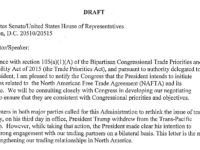Last week I posted on the leak of the draft notice from the Trump Administration on the NAFTA renegotiation, which identifies at least 40 issues, will serve as the starting point for discussions once talks begin. The post unpacked some of the general language to decipher what the U.S. has in mind on intellectual property issues. This second post examines some of the digital issues that U.S. officials have indicated will form a key part of the updated trade agreement.
News
Access Copyright Channels Sean Spicer in Comments on Copyright Fair Dealing Ruling
Access Copyright issued a release on a 2016 Copyright Board decision on March 31st that might have been mistaken for an April Fool’s joke had it been issued a day later. Channeling White House spokesperson Sean Spicer’s penchant for implausible spin, the copyright collective commented on the board decision involving copying in K-12 schools by arguing the decision confirmed that “fair dealing does not encompass all of the copying in education.” Leaving aside the fact that no one has said that it does (hence paid access remains by far the most important method of access), the Access Copyright decision will come as a surprise to anyone who read its response to the decision when it was first released, when it called it a “deeply problematic decision for creators and publishers.”
Access Copyright filed a judicial review of the ruling only to lose badly at the Federal Court of Appeal, which upheld virtually all of the Board’s decision (the only exception was a minor issue on coding errors in its repertoire, which is the source of the reconsideration referenced in the release). Access Copyright presumably issued the announcement on a year-old decision in response to the fact that the deadline has passed for an appeal of the Federal Court of Appeal ruling to the Supreme Court of Canada. What stands – and what Access Copyright seemingly endorses with its latest spin – includes:
Deciphering the U.S. NAFTA Digital Demands, Part One: Intellectual Property
The leak of the draft notice from the Trump Administration on the NAFTA renegotiation, which identifies at least 40 issues, will serve as the starting point for discussions once talks begin. Coverage of the U.S. interests has emphasized tariff issues, rules of origin, and tax treatment, but the digital issues should not be overlooked. The U.S. starting position looks a lot like the TPP, which suggests that we already have a very clear understanding of the text that U.S. negotiators will propose. This post unpacks some of the general language to decipher what the U.S. has in mind on intellectual property issues. A second post will review the other digital issues, including privacy and e-commerce rules.
Fixing PIPEDA: My Appearance Before the Access to Information, Privacy & Ethics Committee
Last week I appeared before the House of Commons Standing Committee on Access to Information, Privacy and Ethics as part of its review of PIPEDA, Canada’s private sector privacy law. The ETHI study is expected to last several months and may provide the foundation for potential reforms. My opening remarks are posted below:











